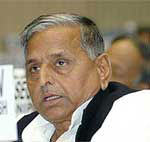Mumbai, Mar 7: Maharashtra Chief Minister and Shiv Sena president Uddhav Thackeray visited Ayodhya on Saturday to commemorate 100 days in office and pledged Rs 1 crore towards the building of the Ram Temple.
Taking a dig at BJP, Uddhav said his party had separated from its erstwhile ally but not Hindutva.
Recollecting the contribution of his father Balasaheb Thackeray, uddhav said he was forced to skip the Sarayu River 'aarti' due to Coronavirus fears but he would continue visiting Ayodhya.
Earlier in the day, the Sena, which heads the tripartite dispensation in the state, said there was no change in its ideology.
Launching a veiled attack on BJP, an editorial in the Sena mouthpiece 'Saamana' also said that Lord Ram and Hindutva is not the sole property of any single political party.
The Sena also said the Maha Vikas Aghadi (MVA) government — which also comprises the NCP and the Congress — has completed 100 days, much to the chagrin of those who were claiming that the new dispensation will not survive more than 100 hours.
“Those whose government lasted for 80 hours were claiming that the Thackeray regime will not last for even 100 hours. But this MVA government not only thrived but has instilled trust in the minds of people during this period with its performance,” the editorial said.
The Sena was apparently referring to the second inning of the erstwhile Devendra Fadnavis government which lasted for only 80 hours in November last year.
"Hence, CM Thackeray's visit to Ayodhya has to be welcomed as he is offering the flowers of works (done by the government) at the feet of Lord Shriram," it said.
The Sena said Thackeray's visit to the temple town is out of devotion for Lord Shriram. "The government in Maharashtra comprising three ideologically different parties is working as per Constitution and Thackeray is leading such government," it said.
The edit said on this background various questions were raised over Thackeray's visit to Ayodhya by his political opponents. "The government maybe backed by anyone, but Uddhav Thackeray and the Shiv Sena remain the same from within and outside. There is no change in the ideology. Lord Shriram and Hindutva is not the property of any single party," it stated.
Referring to senior RSS leader Suresh 'Bhaiyyaji' Joshi's remark that the Hindu community is not synonymous with the BJP and that opposing the BJP does not amount to opposing Hindus, the Sena said similarly Ayodhya belongs to all.
"The political and cultural battle in Ayodhya is now over. The Supreme Court cannot be thanked enough for this (for its verdict in the Ram Janmabhoomi-Babri Masjid dispute case that allowed construction of the Ram temple)," it said.
Hailing the Supreme Court's November, 2019 verdict, the Sena said the country had to fight a big battle to prove that Ayodhya belonged to Lord Shriram.
"In that battle, several (people) were unmasked. But only (late) Shiv Sena president Balasaheb Thackeray stood behind the Ayodhya (temple) campaigners like a mountain," it said.
Bal Thackeray created trust among Hindus from across the world about the creation of the temple, the Sena said. The party further said late Thackeray's assertion that he was proud if the Babri mosque was razed by Sena workers and that the temple of Lord Ram would come up in Ayodhya was akin to the thunder of "thousands of lightnings" in the sky.
"The Hindu culture got lit up in the glow of that lightning. The resplendent rays showed the path of power to the Hindu community. Hence, no one can deny the contribution of the 'Hinduhridaysamrat' (Bal Thackeray) as good as that of Lord Shriram, in creating the current political order in the country," the Sena said.
"We have experienced several times that Balasaheb lives in the mind of Ayodhya. Now Uddhav Thackeray himself is going there with the same faith. He had gone there when not in power. He is going there now after becoming chief minister with the same humility. Lord Shriram is of everyone," the Sena said.
The party said Maharashtra is being run on the path shown by Lord Shriram and Chhatrapati Shivaji Maharaj. "A Ram Rajya entails fulfilling promises made to the people. This is precisely what Mahatma Gandhi wanted, and the government following this ideology is in place in Maharashtra. It will continue work on that line. Ultimately, Lord Shriram is there to support it," the Sena said.
Thackeray completed 100 days in the office on Friday. He had assumed office as the chief minister of the Sena-led Maha Vikas Aghadi (MVA) government on November 28 last year, after the Sena joined hands with the NCP and the Congress.
Senior Sena leader Sanjay Raut had said that Thackeray will not take part in the 'aarti' programme on the banks of river Sarayu in the temple town.





Comments
Add new comment